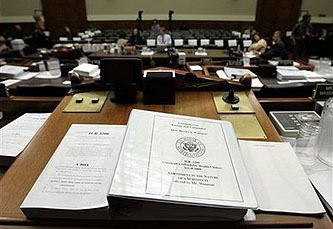 As we wait for the State of the Union address to begin, what’s the status of healthcare reform this particular micro-instant? Here are a few miscellaneous clues:
As we wait for the State of the Union address to begin, what’s the status of healthcare reform this particular micro-instant? Here are a few miscellaneous clues:
Nate Silver counts noses in the House and concludes that all is not lost: “The math is challenging, but not impossible. Although Democrats can expect at least 7 defections among people who voted for the bill originally and possibly as many as 15-20, there are at least a dozen and possibly as many as 15-18 Democrats who could at least potentially be whipped in favor of the bill….Democrats will require both some focus and some luck. Nevertheless, the path to health care is probably still there, obscured as though it might be by the dramatics of the past eight days.”
Jon Cohn senses that there’s more room for compromise than it seems: “Most of the centrist senators complaining about reconciliation aren’t ruling it out altogether: If you read their quotes carefully, you’ll see most of them express concern but leave room to embrace reconciliation under certain conditions — if the process is “transparent,” if the changes themselves are relatively narrow, and so on. It’s exactly the kind of posturing you’d expect in a negotiation. The end is not here. It may not even be that near.”
Chris Hayes thinks passing the Senate bill along with a reconciliation deal is hard but doable: “After spending much of yesterday talking to folks on capitol hill, it’s clear there is increasingly consensus on a path forward….This does not mean, by any earthly means, this is a done deal….But there’s a very doable path forward, and there are almost certainly the votes to get it done. It really is a question of political will and pressure at this point. That may not be very comforting given the lack of leadership demonstrated over the last two weeks, but it’s something.”
Greg Sargent reports on what kind of leadership Obama is likely to offer tonight: “White House communications director Dan Pfeiffer told Capitol Hill staffers on a private briefing call that in his speech tonight, Obama will leave no doubt that his commitment to addressing health care is as strong right now as it was in his September speech, a White House official tells me….There had been some talk that Obama might call for a scaled-down approach tonight. Others wondered whether he would give the issue short shrift. But both of those possibilities seem unlikely, given what Pfeiffer is telling Hill staff.”
Hmmm. I hope Obama offers a whole lot more than just a vague affirmation that his commitment to healthcare is as strong as ever. What I’d like to hear from him is a clear and compelling sales job for the Democratic plan and an equally clear sign of support for passing the Senate bill along with some later fixes. We know he’s in favor of healthcare reform already. Now we need to know exactly what he’s willing to put the full weight of his presidency behind.
Basically, I’m with Andrew Sullivan on this: “I have one simple test: if the health bill dies from neglect and irresolution, Obama is no leader. He is a follower.” It’s time to lead.
As usual, I’ll be liveblogging the SOTU tonight. All the cool bloggers have decamped to Twitter for their real-time response, but I’m going to continue kicking it old school this year in addition to whatever quick tweets I send out. See you in an hour.

















